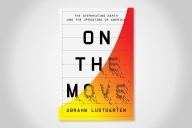You have /5 articles left.
Sign up for a free account or log in.
 Think Again: The Power of Knowing What You Don't Know by Adam Grant
Think Again: The Power of Knowing What You Don't Know by Adam Grant
Published in February 2021
Adam Grant is a mensch. Grant, a professor at Wharton, is the sort of academic that gives academia a good name.
The reputation that Grant has built for generosity to his students and colleagues is mirrored in his writing, most recently in his latest book, Think Again.
As an organizational psychologist, Grant is interested in the choices that lead to productive workplace cultures and thriving professional careers.
The main argument of Think Again, which Grant robustly grounds in research and data, is that smart thinking requires a willingness to rethink. Combining illuminating stories with peer-reviewed research, Grant shows the importance of flexible and open thinking.
Grant recommends that the key to long-term success is privileging values over ideas in defining your actions and worldview. The reason for this approach is that our ideas about how the world works should remain fluid as new information is acquired and as the context changes.
The best forecasters update their hypotheses often, and the best business leaders are willing to shift their strategies based on new data.
Think Again arrives at a critical time for the industry in which Grant works. Post-pandemic, higher education will need to rethink many of the core assumptions and ideas unquestioned before COVID-19.
In what areas might colleges and universities wish to think again?
What might have Grant concluded if he had turned his organizational psychology lens on academia instead of companies like BlackBerry? (Grant’s retelling of the BlackBerry story from the perspective of the dangers of stubborn adherence to an idea in Think Again is illuminating.)
The most prominent areas of the COVID-19-driven academic rethink are online education and remote work. Before the pandemic, online learning and remote working were mostly understood in higher education as the exception.
Post-COVID-19, I suspect that most colleges and universities will think again about these categorizations. The lines between online and face-to-face learning and campus-based and remote work will blur. There will no longer be such a thing as an all residential course or an all-campus-based job.
Learning and work in higher education will become flexible and blended by default. Online education and remote work will -- after COVID-19 -- be just education and work.
If it takes a global pandemic to make the higher education industry think again, what might it take for you and me to rethink our ideas?
Reading and discussing Grant’s Think Again might prompt those who work in academia to rethink many of the ideas we hold about what higher education “must” be.
What aspects of higher education do you think need to be rethought?
What are you reading?








